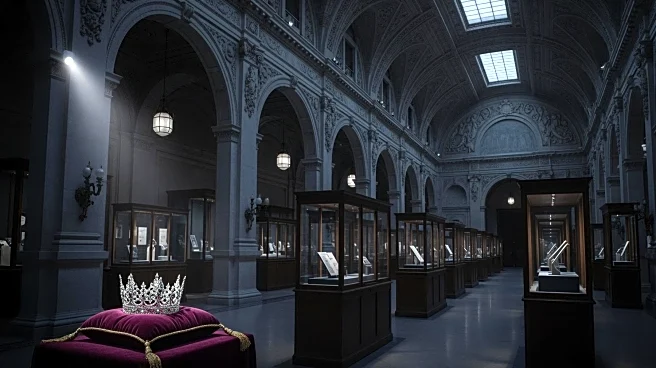What's Happening?
The Louvre Museum in Paris closed its doors after a group of thieves executed a swift heist, stealing several pieces of 'priceless' jewelry from the Galerie d'Apollon. The robbery, which lasted approximately
seven minutes, involved the use of a truck with a lift and an angle grinder to access the museum and breach display cases. French Interior Minister Laurent Nuez confirmed the theft, emphasizing the historical value of the stolen items. The museum's closure allowed for a thorough investigation by French authorities, who are actively pursuing the perpetrators.
Why It's Important?
This incident is a major security breach at one of the world's most renowned museums, raising concerns about the protection of cultural heritage. The theft of such valuable items not only represents a significant cultural loss but also highlights potential weaknesses in museum security systems. The event could lead to increased scrutiny of security measures at cultural institutions and may impact public confidence in their ability to safeguard national treasures. The heist also has broader implications for the tourism industry, as the Louvre is a key attraction in Paris.
What's Next?
French authorities are conducting an extensive investigation, including reviewing CCTV footage and interviewing witnesses. The government has committed to enhancing security at the Louvre, which may involve technological upgrades and increased staffing. The recovery of the stolen items is a priority, although experts caution that such jewels are often altered to evade detection. The incident is likely to prompt discussions about the balance between public access and security at cultural institutions, as well as the need for international cooperation in recovering stolen artifacts.
Beyond the Headlines
The heist underscores the ongoing challenges faced by museums in protecting their collections while remaining accessible to the public. The incident may lead to a reevaluation of security protocols and the adoption of innovative solutions to address vulnerabilities. Additionally, the theft raises ethical questions about the responsibilities of museums in preserving cultural heritage and the potential impact of mass tourism on security. The event also highlights the importance of international collaboration in addressing cultural property crimes.










